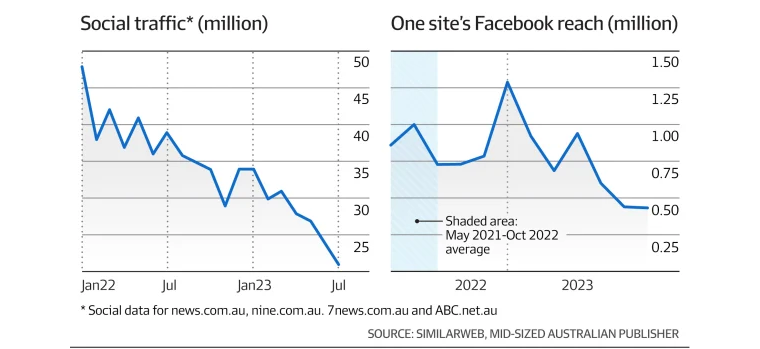Breaking up with the news

Picture this. It’s 2020, the pandemic has arrived with a bang and Big Tech companies’ share prices are soaring while the opposite is true for newspapers and TV. Australia’s then-Treasurer Josh Frydenberg settles in for his regular tennis and beer session with good mate Ryan Stokes – Josh was best man at his wedding – when he is told how big foreign social media companies were crowding out local companies such as his billionaire dad Kerry Stokes’ Seven West Media.
The solution must have seemed so obvious: why not just force Big Tech to pay for linking to Australian news articles? Sure, the idea might run counter to the entire foundations of the internet, but what are they going to do about it?
And so it was that the Australian government drafted and passed the infamous News Media Bargaining Code (the Code) in 2021, a law which essentially strong-armed Big Tech into signing “deals” with Australian newspapers for the privilege of letting its users post links to their articles.
The then-head of the ACCC, Rod Sims, hailed it as “a big success”:
“Rod Sims, chair of the Australian Competition and Consumer Commission, told the Financial Times on Tuesday that the country’s world-first news media bargaining code had forced big technology platforms to the negotiating table to agree deals with publishers.
“We are on track for deals all around. It’s been a big success,” Sims said in an interview. “We are just about there and the media companies are happy — and that’s the key point.”
If social media companies didn’t sign one of these “deals” and their users kept posting links, the Treasurer had the power to “designate a digital platform as being under the news media bargaining code”, which would have almost certainly resulted in payments above and beyond whatever “deal” they could negotiate privately. So they conceded defeat and signed deals to keep news on their platforms.
Fast forward two years and it turns out that being extorted didn’t go down too well in Silicon Valley. According to the NYT:
“Campbell Brown, Facebook’s top news executive, said this month that she was leaving the company. Twitter, now known as X, removed headlines from the platform days later. The head of Instagram’s Threads app, an X competitor, reiterated that his social network would not amplify news.
Even Google — the strongest partner to news organizations over the past 10 years — has become less dependable, making publishers more wary of their reliance on the search giant. The company has laid off news employees in two recent team reorganizations, and some publishers say traffic from Google has tapered off.
If it wasn’t clear before, it’s clear now: The major online platforms are breaking up with news.”
A key reason why social media companies are breaking up with the news is because the “success” of Australia’s Code (let’s be honest, we’re chicken shit in terms of market size) left a strong scent of rent seeking that other countries, including New Zealand, Canada, and even US States such as California, couldn’t resist: they just had to try and slice off their own piece of the Big Tech pie.
With the writing on the wall, social media companies adapted by reducing their reliance on news for views. Since the passing of Australia’s Code, social media links to news articles have collapsed worldwide:
“[R]eferrals from the Facebook app to news sites have plummeted because articles are no longer receiving any algorithmic support. Meta Platforms Inc. — as the company is known now — has discontinued the special tab on Facebook for news content in the US, UK and elsewhere, and the company openly said it wouldn’t prioritize news on Threads, its new competitor to X, formerly known as Twitter.”
Facebook went even further in Canada, scrapping news entirely months before the release of its new bargaining code, which was based on Australia’s model:
“Small and mid-size publishers across Canada are suffering sharp drops in traffic and revenue as Meta has been locked in a standoff with the government over a law requiring that it pay news organizations for their content, according to a report.
Meta yanked news from Canadian publishers from Facebook and Instagram in August after Canada’s Parliament approved legislation two months prior that calls on Meta and Google to compensate domestic media outlets when they promote their news reports.
The bill — dubbed Bill C-18, or the Online News Act — isn’t set to fully take effect until Dec. 19. Meta, however, has already decided to stop sharing news from Canadian organizations rather than pay up, according to The Wall Street Journal.”
Notice the first sentence: it’s publishers that are suffering, not social media companies, which is why the law was so silly in the first place. Publishers are the beneficiaries of traffic flowing from social media links, not the other way around! It’s especially bad for smaller publishers, with whom social media companies do not have to negotiate under these Codes, so they lose social media traffic and get none of the temporary sugar hit from a “deal”.
What about where it all started? It seems link traffic to Australian news has also collapsed, despite Big Tech signing a bunch of multi-year deals with the legacy media companies:

“Combined referrals from social media platforms for four of Australia’s most popular news websites – news.com.au, nine.com.au, 7news.com.au and abc.net.au – show a fall from nearly 50 million to just over 20 million a month, according to SimilarWeb. Facebook referrals comprise the vast majority of that social traffic.
…
The move away from news content comes as all of Facebook’s deals under the News Media Bargaining Code – Australian legislation that compelled Facebook and Google to negotiate with publishers to pay for content – approach their expiry date.”
I suspect we might see the likes of Facebook renew its deal one more time – for considerably less money – before it eventually pivots away from news entirely. It’ll be tougher for search engines like Google, but you can be sure they’ll be working on an exit strategy.
A “big success” indeed, but only if you’re Ryan Stokes or Lachlan Murdoch. For the rest of us plebs, unless you never wanted to see links to news on social media to begin with, then the quality of the service has declined for no discernible benefits.
